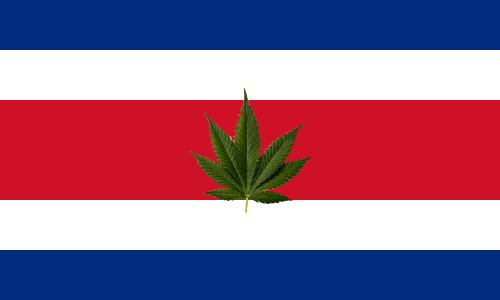
El presidente de Costa Rica, Carlos Alvarado, dijo que su Gobierno apoyará la producción de cáñamo para reactivar la economía del país. Por culpa de la pandemia del coronavirus Covid-19, la economía de muchos países se ha visto tristemente tocada y el país de Centroamérica no es una excepción.
"Impulsaremos el cultivo del cáñamo para reactivar el sector productivo, con todas las garantías y seguridad del caso", anunció su presidente a la Asamblea Legislativa, esta semana.
El año pasado ya se presentó al Congreso, por parte de la diputada Zoila Volio, un proyecto de ley para legalizar el cáñamo en costa rica. El proyecto presentado buscaba regular la producción de la planta para fines industriales o medicinales.
El presidente, Carlos Alvarado, por otra parte, no especificó ni dejó claro si su apoyo y apuesta pro la producción de cáñamo estaba relacionado con el proyecto anteriormente presentado por la diputada. No dio más detalles.
"El Proyecto 21 388 tiene como objetivo contribuir a la calidad de vida de los pacientes con ciertas condiciones, crear empleos, contribuir a la tesorería pública, diversificar la agricultura y fortalecer nuestros talentos en tecnología", dijo la diputada Volio en las redes sociales el mes pasado.
Costar Rica buscaría no solo la producción y cultivo de cáñamo. Además, se buscaría crear una industria que produzca y exporte productos como productos y derivados de la planta, aceites, alimentos, telas, materiales de construcción y más. También, se otorgarían licencias para la comercialización de fármacos a base de cannabis, así como regular el uso de semillas y la siembra de la planta.
El jefe de fracción oficialista, Enrique Sánchez, se mostró a favor y actualmente estarían trabajando en un texto con varios diputados para poder llegar todos a un acuerdo.
El mismo plan argumenta que muchos países del mundo ya se están poniendo en marcha con esta industria. Naciones como Francia, Canadá o Suecia existen industrias especificas dedicadas a la producción de derivados de cáñamo.
Las autoridades costarricenses prevén una caída del 3,6% del Producto Interno Bruto (PIB) local este año debido a los embates de la propagación del virus.
También el Ecuador, se está planteando incentivar esta industria del cáñamo como alternativa para dinamizar economía, afirmaba el diario ecuatoriano El Universo.
Sería para principios del mes de junio, cuando se
esperaría la legalización de cultivos de cannabis para uso medicinal
estuviese vigente. Esto sería después de las reformas realizadas al
Código Orgánico Integral Penal (COIP).
En estos tiempos de pandemia
mundial y sin existir un reglamento que regule esta actividad; la
industria del cánamo se perfilaría como una contribución para reactivar
la económica ecuatoriana.
La Asociación Ecuatoriana de Cáñamo Medicinal e Industrial EcuaCáñamo, estaría preparando información de esta industria para entregar al
Ministerio de Agricultura y Ganadería.
Con la iniciativa, se buscaría seguridad para el inversionista y desarrollar normas eficientes que permitiesen la creación de una industria integrada verticalmente en Ecuador.
LUPA RUBRA
Costa Rican President Carlos Alvarado said his government will support hemp production to revive the country"s economy. Due to the Covid-19 coronavirus pandemic, the economy of many countries has been sadly affected and the country of Central America is no exception.
"We will promote the cultivation of hemp to reactivate the productive sector, with all the guarantees and security of the case," its president announced to the Legislative Assembly this week.
Last year, Congresswoman Zoila Volio presented Congress with a bill to legalize hemp in Costa Rica. The project presented sought to regulate the production of the plant for industrial or medicinal purposes.
The president, Carlos Alvarado, on the other hand, did not specify or make it clear if his support and commitment to hemp production was related to the project previously presented by the deputy. He did not elaborate.
"The Project 21 388 aims to contribute to the quality of life of patients with certain conditions, create jobs, contribute to the public treasury, diversify agriculture and strengthen our talents in technology," said Rep. Volio on social networks on last month.
Costar Rica would seek not only the production and cultivation of hemp. In addition, it would seek to create an industry that produces and exports products such as plant products and derivatives, oils, food, fabrics, construction materials, and more. Also, licenses for the commercialization of cannabis-based drugs would be granted, as well as regulating the use of seeds and planting of the plant.
The head of the ruling party, Enrique Sánchez, was in favor and they are currently working on a text with several deputies in order to reach an agreement.
The same plan argues that many countries in the world are already getting started with this industry. Nations like France, Canada or Sweden exist specific industries dedicated to the production of hemp derivatives.
Costa Rican authorities forecast a 3.6% drop in local gross domestic product (GDP) this year due to the impact of the virus"s spread.
Ecuador, too, is considering promoting this hemp industry as an alternative to boost the economy, said the Ecuadorian newspaper El Universo.
It would be at the beginning of June, when the legalization of cannabis crops for medicinal use would be expected to be in force. This would be after the reforms made to the Organic Comprehensive Criminal Code (COIP).
In these times of world pandemic and without a regulation to regulate this activity; the hemp industry would emerge as a contribution to revive the Ecuadorian economy.
The Ecuadorian Association of Medicinal and Industrial Hemp EcuaCáñamo, would be preparing information on this industry to deliver to the Ministry of Agriculture and Livestock.
The initiative would seek investor security and develop efficient standards that would allow the creation of a vertically integrated industry in Ecuador.
LUPA RUBRA